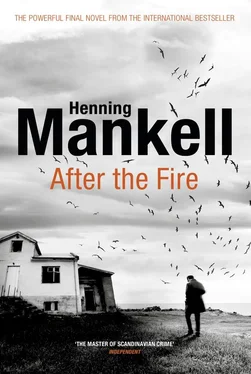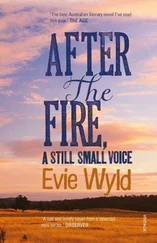I accelerated and headed home. A few Canada geese were flying around beneath the grey clouds, unable to find their route south.
Back home I solved a chess problem in the local paper; it was much too easy. The most stupid amateur could work out that a combination of moves involving a castle and a bishop would quickly lead to checkmate for the black pieces. I felt like contacting the paper to complain about the way they regarded their readers as idiots, but of course I didn’t do it. Those occasions when I have felt like protesting and have actually done so are few and far between.
It was hot inside the caravan. In spite of the fact that darkness had fallen, I undressed, picked up my torch and went to the boathouse. I climbed down into the water and forced myself to swim a few strokes before the cold got too much for me. I was on my way up the ladder when I heard my phone ringing; I had left the door of the caravan ajar. I set off at a run, but slipped and fell over one of the wet stones in the grass.
I put my clothes back on before I checked to see who had called. I could only think of two people: Louise or Jansson.
It was Lisa Modin. I called her back, but it was ages before she picked up. I was about to give up when she answered, sounding surprised to hear my voice.
‘You called me but I couldn’t get to the phone in time,’ I explained. ‘I’d just been for a dip and I was down by the jetty.’
‘I didn’t call you.’
‘But my phone is showing your number.’
‘I don’t understand that — I didn’t call you.’
‘And I’m not mistaken.’
She was breathing heavily, as if she had just run a long way uphill.
‘I’ll call you back,’ she said. ‘I need to check this out.’
I sat down to wait; she rang me after ten minutes.
‘I didn’t call you,’ she said yet again. ‘I must have accidentally pressed a button when the phone was in my pocket.’
‘So you didn’t intend to speak to me?’
‘Not right this moment, no.’
‘In that case it’s probably best if we end this conversation now.’
I rang off before she had the chance to say any more and threw my phone down on the bed. It was still lying there when it started ringing again. I ignored it. I couldn’t work out what I was doing.
I did, however, send a text an hour later. You’re still welcome to come to the New Year party. Unless you’ve changed your mind.
She didn’t reply until after midnight, by which time I had given up hope that she would still come. The display showed just one word: Yes .
I lay there for a long time, thinking about that one word. Yes.
I was woken at dawn by cramp in one leg. I wondered if I had developed diabetes; cramp in the calves is a common symptom. However, I wasn’t drinking large amounts of water or getting up to pee during the night.
I dug out a blood glucose meter from one of the plastic bags where I keep my medical supplies; the reading was 6.9. I didn’t have diabetes.
In a burst of impatient energy I tidied the caravan. I hadn’t really touched the place since I moved in. I lit a fire in an old oil drum where my grandfather used to burn his rubbish and chucked in all the crap I had accumulated over the past few weeks. I got rid of one of the blue Chinese shirts; the colour had already faded, the cuffs were frayed and the stitching around the buttonholes was coming undone. I fed the shirt slowly into the flames.
When I was a child, if I had toothache I would sometimes take revenge by pulling the wings off insects. A painful bruise could be eased by drowning a pretty butterfly or by laying a perch on the shore and letting it suffocate.
Now I took my revenge by torturing things that were already dead. This time the Chinese shirt would pay the price.
Later in the day I rowed out to the skerry. The tent was still there, although the recent storm had ripped out some of the pegs. The stones and twigs I had positioned to reveal the presence of an intruder were exactly where I had left them. Nor had anyone lit a fire among the soot-covered rocks.
The sea was calm now. On my way back to the island I looked for the drift net I had seen earlier in the autumn, the net that carried on fishing even though no one would ever empty it.
That night there was a heavy snowfall in the archipelago. At dawn I undressed and went down to the water completely naked, using my torch to pick a path through the snow.
Winter had arrived. Soon it would be Christmas, then New Year.
The snow stayed until Christmas but melted away on the third day, when warmer winds blew in from the south. I hung coloured lanterns between the boathouse and the caravan. Veronika brought extra chairs and crockery, along with some of the food. We did a trial run, setting everything out in the caravan; it was a tight squeeze, but it would be OK.
New Year’s Eve was cold and clear, and there wasn’t a breath of wind. At three o’clock in the afternoon Veronika got everything ready and gave me my final instructions concerning the food. In order to make things easier for me, the soup was in Thermos flasks; she had also lent me an extra LPG hob, which we set up in a sheltered spot behind the caravan.
We drank a toast to wish each other a Happy New Year, then said our goodbyes on the jetty as I waved her off on her trip to Iceland.
Jansson arrived at seven, having picked up Lisa Modin. Burning torches lit the way to the caravan. Jansson spent half an hour sorting out his firework display.
The three of us sat down at the little table and we ate and drank from half past seven until just after eleven. By then we were all tipsy, the food was gone, and it was so hot inside the caravan that Jansson had taken off his shirt and was sitting there bare-chested. When Lisa went out for a pee, I asked Jansson if it wasn’t time for a song. He brightened up as if he had been afraid that I wouldn’t mention it. However, he didn’t want to sing just yet; he would prefer to wait until midnight.
‘ “Ave Maria”,’ I said. ‘You have to sing “Ave Maria”.’
‘I promise, but I have another song too.’
I couldn’t help wondering what it might be.
‘ “Buona Sera”,’ he said. ‘Made famous by Little Gerhard in Sweden in the 1950s.’
I thought I remembered the song he was talking about, but I would have preferred the combination of ‘Ave Maria’ with something other than Little Gerhard.
‘Excellent,’ I said. ‘Very good.’
Lisa came back, her gaze slightly unfocused. She tripped and laughed at her own clumsiness.
I had a bottle of champagne on ice: Veuve Clicquot. I remembered the name from a wedding anniversary that my father hadn’t forgotten, much to my mother’s surprise. He had come home with this very label. When Louise arrived with Agnes, Ahmed and Muhammed one day, we would also celebrate with Veuve Clicquot.
We finished off a bottle of red first, then I went outside and called Louise, who was at the hospital.
‘You’re drunk,’ she said. ‘I’m glad to hear it!’
Midnight was approaching. Jansson insisted that his watch was accurate to the second; none of us wanted the TV or radio on. The thermometer by the caravan door was showing plus two. The coloured lanterns were reflected in the calm, shining water, and ragged clouds drifted slowly above our heads. Jansson led the way up to my grandfather’s bench; I could hear him quietly warming up his voice. I took Lisa’s arm when she stumbled, and she didn’t pull away.
We were surrounded by silence. Jansson fixed the beam of the torch on his magic watch. I tried to picture Louise, Agnes and her family, Muhammed in his wheelchair, all of them perhaps gathered by a window.
We stood there on the hill as if we were the last people in the world. Jansson began to count down the remaining seconds of the old year. I gripped Lisa’s cold hand, and still she didn’t pull away. With the other hand I felt in my pocket to make sure I had my cigarette lighter to give to Jansson so that he could start his firework display.
Читать дальше












